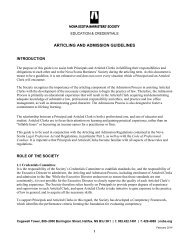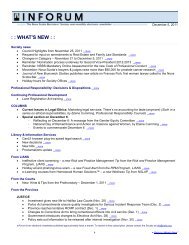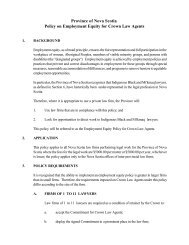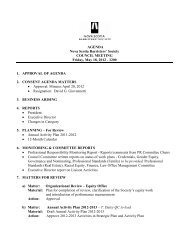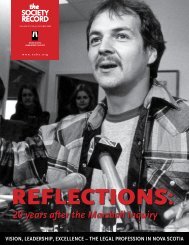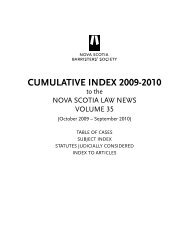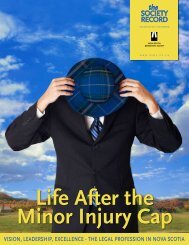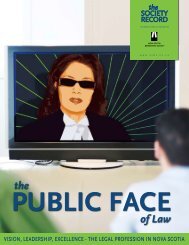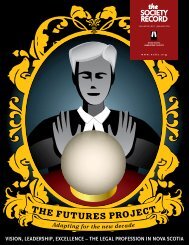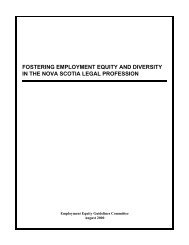SR Vol 25 No 1, January 2007 - Nova Scotia Barristers' Society
SR Vol 25 No 1, January 2007 - Nova Scotia Barristers' Society
SR Vol 25 No 1, January 2007 - Nova Scotia Barristers' Society
Create successful ePaper yourself
Turn your PDF publications into a flip-book with our unique Google optimized e-Paper software.
In Defence ofSmall ClaimsCourtOn April 1, 2006 the financial limit for the Small ClaimsCourt increased from $15,000 to $<strong>25</strong>,000. The increasebrought concerns that the new limits would enable “deeppocketed” corporations and their lawyers to oppress “the little guy”,who could not afford legal representation. 1 Coupled with theseconcerns is a tendency on the part of members of the Bar as well asthe Supreme Court to want to impose more formal procedures onthe Small Claims Court, perhaps on the reasoning that a financiallimit that approaches the industrial average wage requires adoption ofmore formal procedures. 2 Finally, there have been suggestions that theLegislature ought to fund the recording of hearings so that judges onappeal could evaluate the fairness of what took place at a hearing.I suggest here that these concerns are misplaced. Increases in thefinancial jurisdiction of the Small Claims Court, in fact, help rightthe balance between “deep pocketed” corporations and “the littleguy”. Attempts to introduce more procedure would only decreaseaccess to justice (both substantive and procedural). And finally,money spent on recording hearings would be better spent on otherchanges to the Small Claims Court that would better improve thepublic’s access to justice.What characterizes the procedure and practice of dispute resolutionin the Small Claims Court? There is a brief description of theclaim, and then the Court assigns a date for the hearing at the timethe claim is issued – a date that is usually only a few months (atmost) away. There is no pre-hearing disclosure or discovery. Thereare no default judgments. The rules of evidence at the hearing arerelaxed. 3 There are no formal rules of procedure, other than theoverarching requirement that claims “are adjudicated informally andinexpensively but in accordance with established principles of lawand natural justice.” 4 And finally, there are no party and party costs.This system – which resembles that of labour arbitrations – providesbetter accessto justice forthe poor, theworking class,W. Augustus (Gus) Richardson, Q.C.AD+REM Alternative Dispute Resolution Services Inc.and indeed for larger segments of the middle class than the complexformality of the Supreme Court. Why? Because it dispenses withmuch that is unnecessary, employs a “procedure” that minimizesthe cost of legal representation (if it is chosen), encourages its mostproductive use (when it is employed), and finally, levels the playingfield between represented and unrepresented parties in court.One of the most obvious differences between the Small ClaimsCourt and the Supreme Court is the former’s lack of disclosureand discovery. The criticism that is sometimes leveled against sucha system is that it constitutes “trial by ambush”. This analogy ismisleading.In a true ambush one side is taken totally by surprise by the other.In the scenario beloved by “B” movie directors, soldiers marchingthrough a narrow defile are suddenly fired upon by attackers whoseexistence is revealed only with the first bullet. The presence of theattackers (and the fact that a battle is about to occur) comes as acomplete surprise to the hapless victims.Such a scenario hardly characterizes what happens when a disputeends up in the Small Claims Court. Most lay litigants know whatthe other side will say and produce by way of documentation. Theyhave been living the “case” (and fighting with the other side aboutit) as active participants, and have been phoning and meeting andwriting letters and emails back and forth to each other for weeks ifnot months before they decided to sue. The documents they arrivein court with are the documents they have been exchanging fromthe start. They may be outraged at what the other side says, but theyare not surprised.<strong>January</strong> <strong>2007</strong> 35



